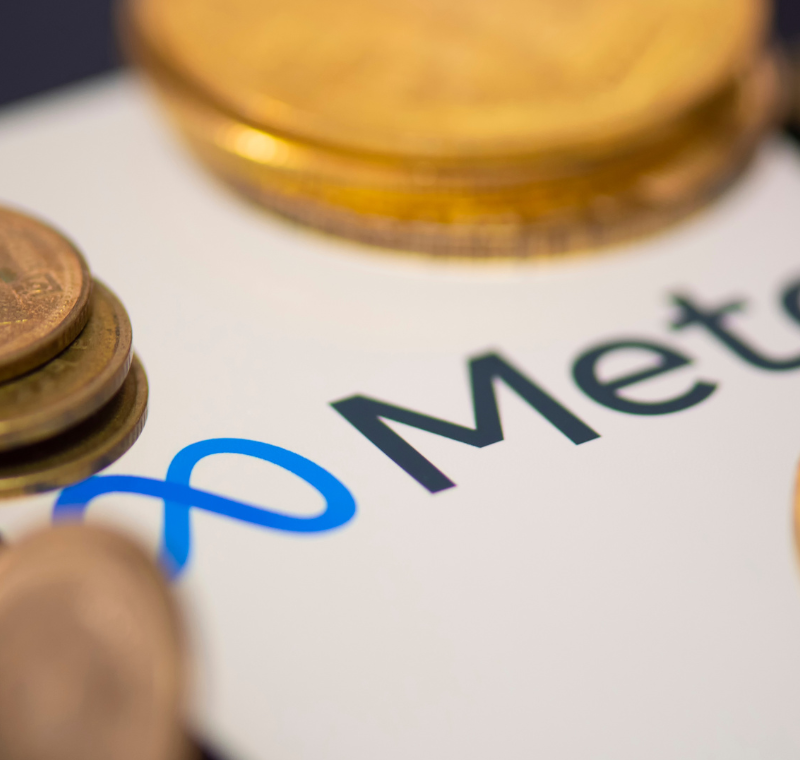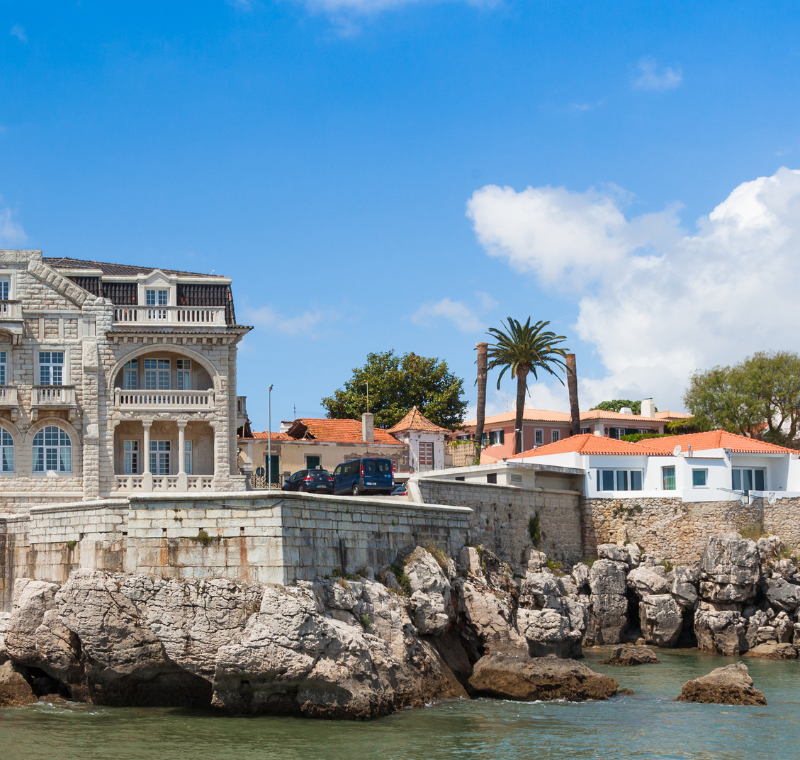How Burda’s ForwardNews+ wants to achieve seven digit sales with a blend of high tech and a team of two
We have all searched for a favourite car or our dream house on vertical digital marketplaces, often launched around the turn of the millennium, in the early days of the Internet. The classifieds advertising market was traditionally “owned” by publishers, but the World Wide Web revolution was underway, young startups took over the reign and became strong in markets, where print giants dominance was carved in stone before. But let’s cut a long story short. Let’s turn directly to the hard facts.
The market for digital classifieds ad revenue worldwide is huge and will reach €12.2bn by the end of 2015. China (€3bn) and the US (€2.69bn) are by far the biggest market for this form of advertising where advertisers pay a fee to display an ad or listing around a specific vertical such as automotive, recruiting or real estate. Germany is with €830m only two thirds of the market volume of UK (€1.21bn) or France (€1.14bn), still enough to be an interesting market for additional revenue streams for publishers. While most of them had been busy in investing into launching, operating and maintaining news vertical marketplaces, which they built from scratch, some found their fate in aggregating content, utilising their own assets to boost traffic or their SEO expertise to match offer and demand along the interest curve following the long tale of content.
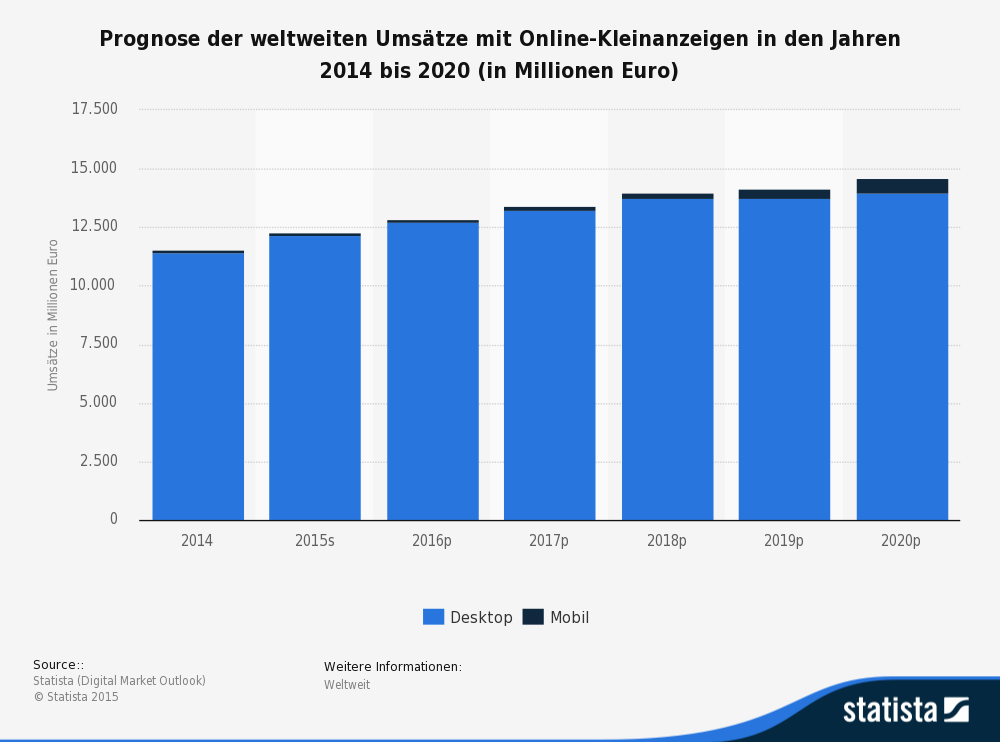
Above: Classified advertising worldwide. Forecast of revenues for 2014 to 2020. Source: Statista in Digital Market Outlook
One of them is BurdaForward, formerly Tomorrow Focus Publishing, which launched a classifieds ads portal at http://kleinanzeige.focus.de in November 2014. The subdomain “Kleinanzeigen,” the German word for classifieds, is powered by BurdaForwards strategic partner rubrikk.no, with which the publisher has an exclusive deal for the German speaking market.
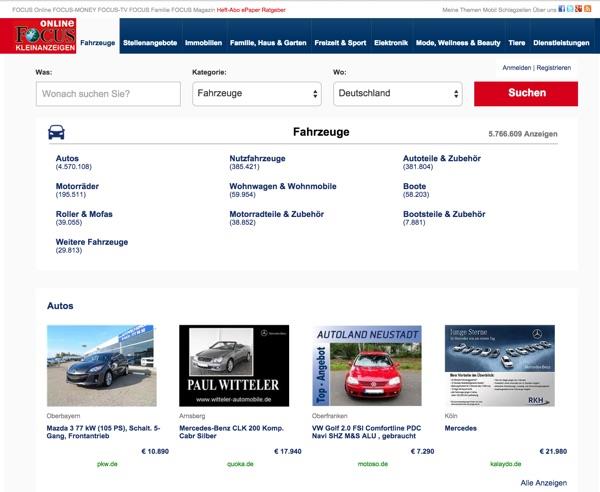
The new subdomain is fully integrated into focus.de, a general news site which is ranked among the top sites on the current leaderboard. With 131m visits in August, focus.de is third-placed following top dogs like bild.de (316.79m) and spiegel.de (193.69m). Slightly more than 50 per cent of its traffic comes from mobile devices already.
Instead of building their own technology, BurdaForward closed an exclusive partnership deal with classifieds ads search engine rubrikk.no, a Norwegian IT company headquartered in Oslo, which powers the meta crawler and search engine technology behind the German aggregator.
Oslo-based rubrikk.no was founded in 2001 at a time shortly after we saw the Internet bubble burst in 2000 dragging the whole digital industry down. The Norwegian company early recognised the importance of the classifieds advertising market and through venture backing developed a meta search solution with the aim to bring it to other international markets. Rubrikk.no’s strategy is not to launch own businesses in foreign countries but to close exclusive deals with tier1 publishers globally, as Adil Osmani, rubrikk.no’s CEO emphasised in an interview by email. “In the partnerships we are totally integrated into our Partner´s brand and URL. We bring in wast expertise in monetising and growing traffic in cooperation with the Partner. We run, host (in the cloud), maintain and continuously develop the solution, so that there is no strain on the Partner´s IT resources.”
To build a business on aggregation comes not without negative connotation as the business model has been controversially discussed in Germany in the context of the so-called “Leistungsschutzrecht” which wants to restrict the usage of digital content by search engines without proper compensation.
In this case and its underlying business model, there is no compensation for using the assets of vertical market places following the same argumentation Google has been reiterating in the public throughout the years: that the service is a traffic machine for the sites included and that this service creates therefore a value of its own, which in contrast asks for some kind of compensation in return. That’s why the business model of the partnership between BurdaForward and rubrikk.no is built on premium services and the selling of PPC campaigns.
The model seems to be highly attractive from a financial point of view. Publishers with high-traffic sites but without own infrastructure to handle the technical challenges of running such vertical market places are now able to monetise their traffic, with minimum effort and little costs as the burden of the infrastructure lies with rubrikk.no. In case of ForwardNews+, which is in charge to operate the site, it only needs one specialist for SEO and one for sales to push the business forward, as Ulf Heyden, Director Commercial FOCUS Online und Huffington Post Deutschland, confirmed.
And deep SEO knowledge and experience is invaluable to grow and establish new markets. In Germany it’s not social media (6-13 per cent), which delivers the traffic to news sites. Instead it is still Google (11-37 per cent) which dominates the leaderboard of traffic referrers country-wide. Social media only contributes 14 per cent of the referrer traffic to focus.de.
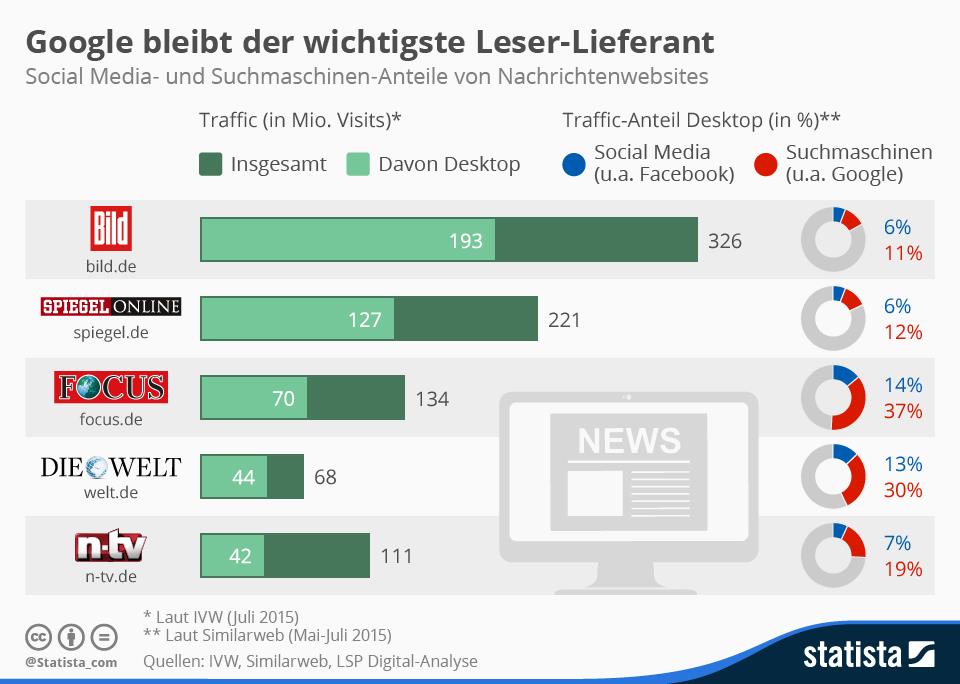
Caption: Google remains the most important traffic referrer for German sites far ahead of social media as a source. Data: IVW, Similarweb. Chart by Statista
Forward Burda’s “Kleinanzeigen” on focus.de has already achieved 2.2m visits per month after less than a year in operation. Seven-digits sales seem to be feasible with minimum financial engagement with only little resources. To set up the technical infrastructure also takes only two months from start to get started as rubrikk.no’s CEO outlined. It’s a serious business opportunity publishers should definitely consider as something worth to explore.



